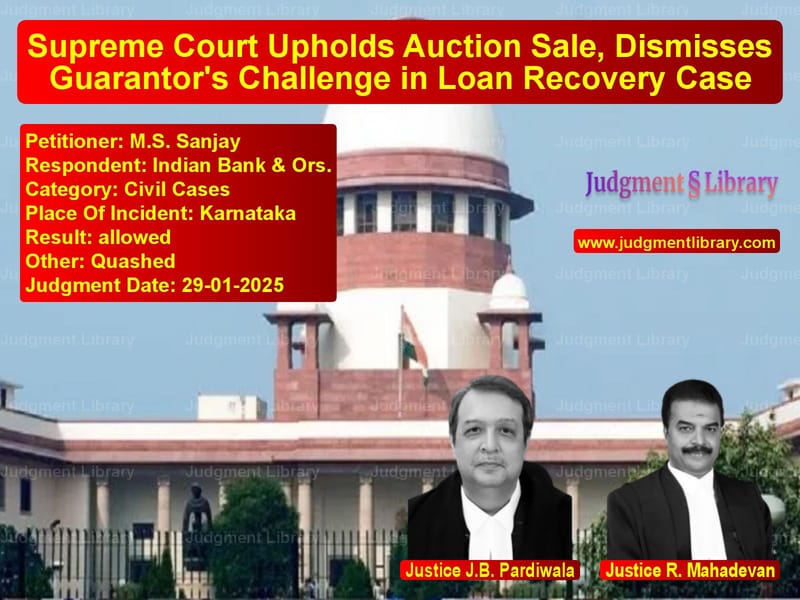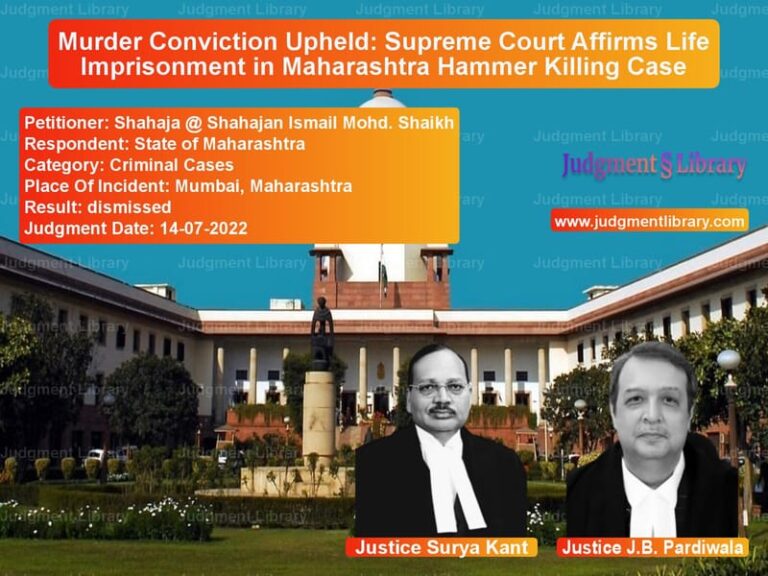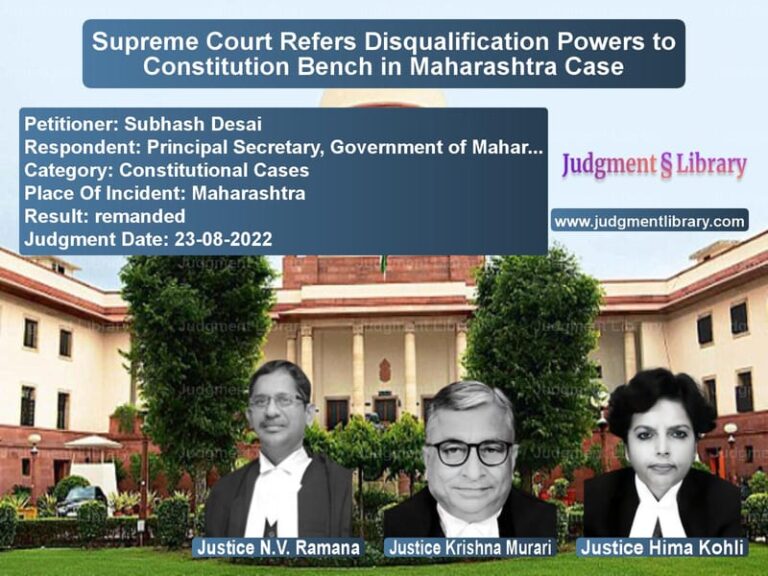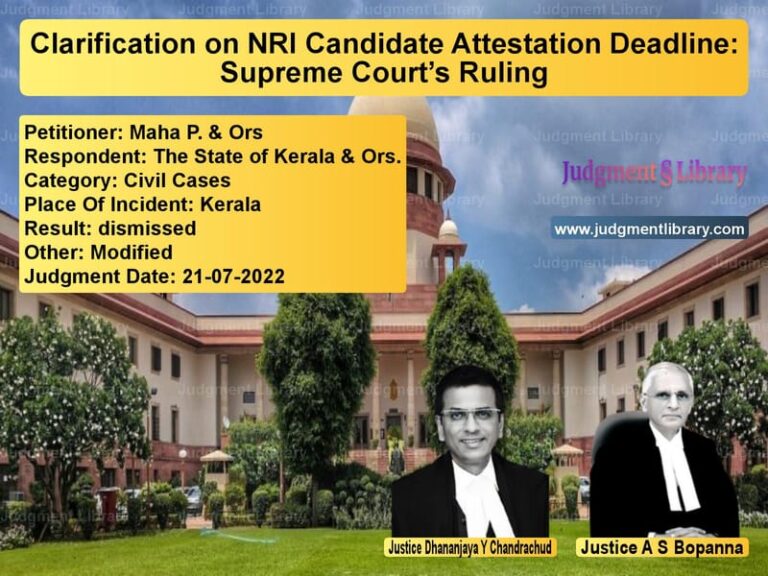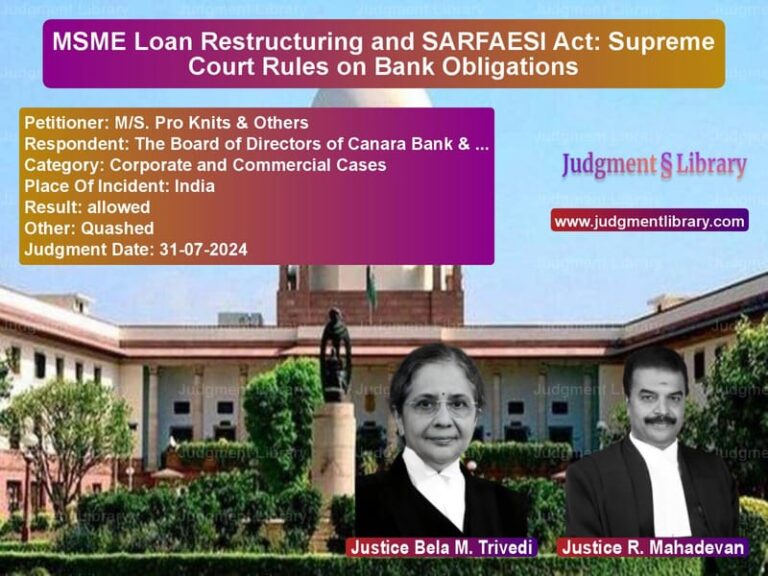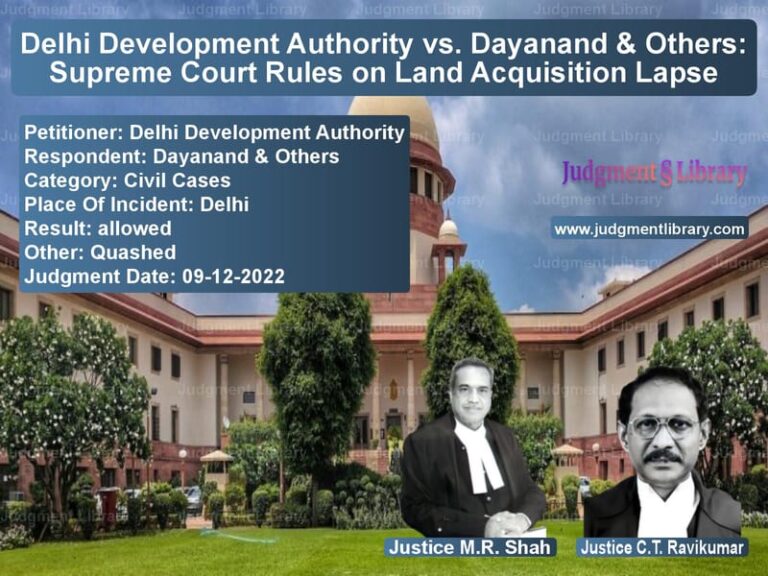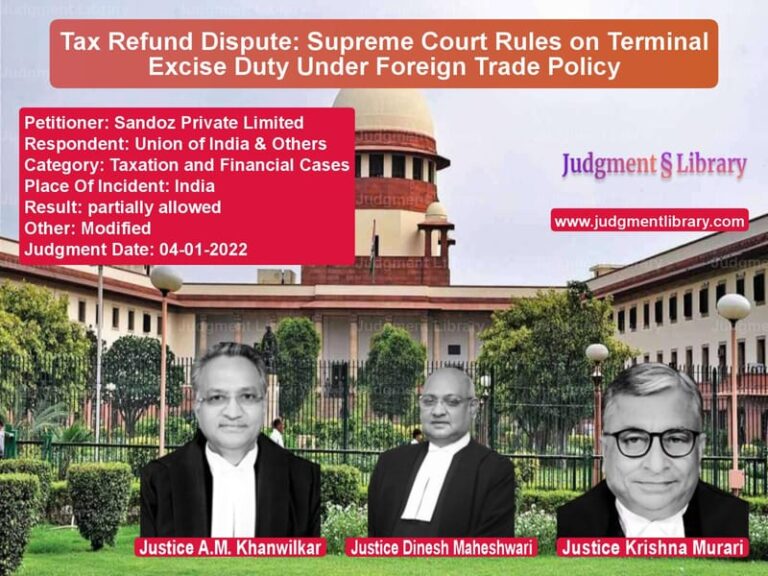Supreme Court Upholds Auction Sale, Dismisses Guarantor’s Challenge in Loan Recovery Case
The Supreme Court of India, in M.S. Sanjay v. Indian Bank & Ors., ruled in favor of an auction purchaser, dismissing a guarantor’s challenge against a 2007 auction sale conducted under the SARFAESI Act. The Court criticized the guarantor’s delayed litigation as frivolous and upheld the finality of the sale.
Background of the Case
The case arose from loan recovery proceedings initiated by Indian Bank against M/s. Arihant Sarees, which had defaulted on a loan. The property in question had been mortgaged to secure the loan. When the borrower failed to repay, the bank invoked the Securitisation and Reconstruction of Financial Assets and Enforcement of Security Interest Act (SARFAESI Act) and conducted an auction sale.
Key Events
- The auction was held on July 31, 2007, and M.S. Sanjay was declared the highest bidder.
- He paid approximately ₹24,00,000 and was issued a sale certificate on November 30, 2007.
- The borrower did not challenge the auction, but the guarantor (Respondent No. 4) approached the Debt Recovery Tribunal (DRT) in 2008.
- The DRT ruled in favor of the guarantor in January 2009, invalidating the auction on technical grounds.
- Indian Bank appealed to the Debt Recovery Appellate Tribunal (DRAT), which reversed the DRT’s ruling in April 2017, upholding the auction.
- The guarantor then approached the Karnataka High Court, which set aside the DRAT ruling in 2019, citing a violation of the mandatory 30-day notice period under the SARFAESI Act.
- The auction purchaser, M.S. Sanjay, then appealed to the Supreme Court.
Legal Issues
Guarantor’s Arguments
The guarantor contended that:
- The auction sale violated the statutory requirement of a 30-day notice before the auction.
- The bank had published a second sale notice on July 16, 2007, but the auction was held on July 31, 2007—providing only 15 days instead of the required 30 days.
- Since the procedural lapse violated the SARFAESI Act, the auction should be set aside.
Bank’s and Auction Purchaser’s Arguments
The Indian Bank and auction purchaser argued that:
- The auction had initially been notified on June 8, 2007, and later re-notified on July 16, 2007.
- The procedural requirement was met, and the sale process was lawful.
- The High Court failed to consider the broader impact of setting aside a long-finalized sale.
- The auction purchaser had invested over ₹1.5 crore in developing the property.
- The guarantor had delayed the challenge for years, and the borrower itself had not objected to the auction.
Supreme Court’s Ruling
The Supreme Court, comprising Justices J.B. Pardiwala and R. Mahadevan, strongly criticized the guarantor’s conduct and the High Court’s ruling. The Court observed:
Finality of the Auction Sale
The Court ruled that the auction had attained finality:
- “The appellant paid the entire sale consideration towards the sale of property which was put to auction, i.e., an amount of ₹24,00,000 (approx.) on November 30, 2007, and a sale certificate also came to be issued.”
- The borrower itself did not challenge the auction, only the guarantor did.
- The High Court should have taken a “practical view” rather than setting aside a long-finalized sale.
Procedural Violations and Substantial Justice
The Supreme Court held that even if there was a technical violation in notice duration, it did not justify nullifying the sale:
- “Interference by the Writ Court for mere infraction of any statutory provision or norms, if such infraction has not resulted in injustice, is not a matter of course.”
- “Legal formulations cannot be enforced divorced from the realities of the fact situation of the case.”
- Setting aside the sale would cause undue hardship to the auction purchaser, who had developed the property at great cost.
Criticism of the Guarantor’s Conduct
The Court condemned the guarantor’s litigation as an abuse of process:
- “The Respondent No. 4 (Guarantor) is wholly responsible for dragging the appellant to a very frivolous litigation and that too on a very technical point.”
- “Till that point of time, neither the borrower nor the guarantor said anything in this regard. It is sometime in March 2008 that the guarantor conceived the idea of challenging the auction proceedings.”
Discretion Under Article 226 of the Constitution
The Court reiterated that High Courts must exercise discretion under Article 226 judiciously:
- “The remedy under Article 226 of the Constitution of India is discretionary in nature.”
- “Even if some action or order challenged is found to be illegal, the High Court can refuse to upset it to do substantial justice.”
Final Judgment
- The Supreme Court set aside the Karnataka High Court’s order.
- The DRAT’s ruling was restored, confirming the auction’s legality.
- The Court refrained from imposing costs but criticized the guarantor’s prolonged litigation.
Implications of the Judgment
This ruling has significant implications for loan recovery proceedings and auction sales under the SARFAESI Act:
- Finality of Auction Sales: Once an auction sale is concluded and a sale certificate is issued, courts should be wary of setting it aside on technical grounds.
- Limited Role of Guarantors: Guarantors cannot challenge an auction sale indefinitely, especially when the borrower itself does not object.
- Judicial Discretion in Writ Petitions: High Courts must balance procedural lapses with substantial justice rather than rigidly enforcing technical rules.
- Protection for Auction Purchasers: Buyers who invest in auctioned properties should not be subjected to prolonged litigation.
This decision reinforces the Supreme Court’s commitment to upholding the integrity of SARFAESI proceedings while preventing misuse of legal provisions to delay debt recovery.
Petitioner Name: M.S. Sanjay.Respondent Name: Indian Bank & Ors..Judgment By: Justice J.B. Pardiwala, Justice R. Mahadevan.Place Of Incident: Karnataka.Judgment Date: 29-01-2025.
Don’t miss out on the full details! Download the complete judgment in PDF format below and gain valuable insights instantly!
Download Judgment: m.s.-sanjay-vs-indian-bank-&-ors.-supreme-court-of-india-judgment-dated-29-01-2025.pdf
Directly Download Judgment: Directly download this Judgment
See all petitions in Contract Disputes
See all petitions in Debt Recovery
See all petitions in Specific Performance
See all petitions in Judgment by J.B. Pardiwala
See all petitions in Judgment by R. Mahadevan
See all petitions in allowed
See all petitions in Quashed
See all petitions in supreme court of India judgments January 2025
See all petitions in 2025 judgments
See all posts in Civil Cases Category
See all allowed petitions in Civil Cases Category
See all Dismissed petitions in Civil Cases Category
See all partially allowed petitions in Civil Cases Category

